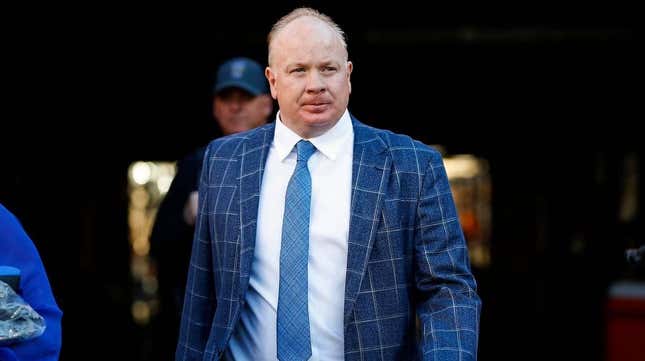
On Wednesday, the performative set of elected officials who gather in Washington D.C. to raise money and occasionally draft legislation held a meeting to discuss the future of Name, Image and Likeness.
This hearing in front of the subcommittee on Innovation, Data and Commerce was about money, but not so much the money that comes to athletes. This is about protecting the NCAA’s money. The university collective recently hired former Massachusetts Governor Charlie Baker to be its new commissioner, and there is a reason a politician was chosen.
The NCAA wants protection from the winds of change, and it sounds like it is finding champions.
Champions like Rep. Gus Bilirakis (Fla.-R), the subcommittee chairman who began the proceedings by saying: “In short, we must strike a delicate balance between the rights of college athletes to profit from their own NIL while keeping the amateur status for all college athletes.”
How quaint.
As the NCAA men’s and women’s tournament finals approach this weekend, with CBS paying the NCAA roughly a billion dollars a year to broadcast the men’s, with former Fab Five legend and college basketball analyst Jalen Rose starring in one of the myriad ads aimed at college sports bettors, and as Fan Duel announces its plans to send sports talk radio host and sports gambling enthusiast Craig Carton to college campuses in the Northeast to educate college students about “responsible gaming,” no one can talk about amateur sports with a straight anymore.
Amateur sports at American institutions of higher education are dead.
The word is an evocative wisp. It smells like peachtree baskets and freshly cut grass. It makes people behind those microphones on a congressional dais feel safe and on sturdy authority: Amateurism.
Amateurism is dead
Except college players are the only ones expected to be amateurs these days. None of those NCAA schools are trying to give back the money from team sponsorships, boosters, and broadcast deals in the name of amateurism. They aren’t fighting to keep sports betting away from college games. In fact, some schools have even partnered with sports betting operators.
The New York Times investigated this trend last fall and details Michigan State’s deal with Caesars that ended up being worth $8.4 million over five years. But, amateurism.
There are certainly players who attend college because of an athletic ability that will not be enough for a pro career, and whose lifetime earnings are multiples of what would have been without that college degree. Many of the speakers in yesterday’s hearing told stories of college players whose lives will be immeasurably better for having played sports.
But that’s not the reason Caesars partners with a university for millions.
The reason that the NCAA is begging congress for legislation to make NIL laws and policies consistent across states is that a firehose of cash around college sports has altered the landscape. Coaches of Division I state school basketball and football teams have at times been the highest-paid public employees in their state. It is abundantly unfair that schools, coaches, corporate partners, sports betting operators, and so many others can profit off an entity that denies that ability to players.
Certainly, the transfer portal has made the job of a college coach so much more difficult. And the chaos around NIL means that schools aren’t just competing against each other for recruits, but doing so within the regional restrictions around NIL compared to those from other states. Are players employees? Should they be able to share in the revenue that their sport brings to a school? Is it ethical for boosters to offer a minimum wage to, say, a lacrosse or volleyball team?
And, most importantly, why is that a matter for Congress?
Why it matters for Congress
The reason we are in this predicament is that the NCAA didn’t want to place any meaningful restrictions on member organizations when it had the chance, and now it is too weak to clip the wings. So now we get to hear lawmakers spend their minutes at a NIL hearing lamely cheerleading their local colleges and trying to grasp the 100 years of sports labor history that brought us to this moment. Go Team!
At least with sports betting, it seems there might be some reining in when it comes to the college space. The U.S. gambling industry is proposing new restrictions when it comes to partnering with schools or offering NIL deals to individual athletes. But make no mistake, educating college-age sports fans about betting is part of the business plan – and if it has to be under the banner of “responsible betting” that’s still educating.
One hearing witness, Executive Director and founder of the College Football Players Association Jason Stahl, noted that when the College Football Playoff expands from four to 12 teams in the coming years, there will be additional billions coming into the system.
“Change is here in college athletics and it’s time for administrators at the NCAA, conferences and member institutions to embrace this change,” Stahl said. “Player empowerment is only going to grow and there can be no return to the paternalism of the past through federal legislation or other matters.”